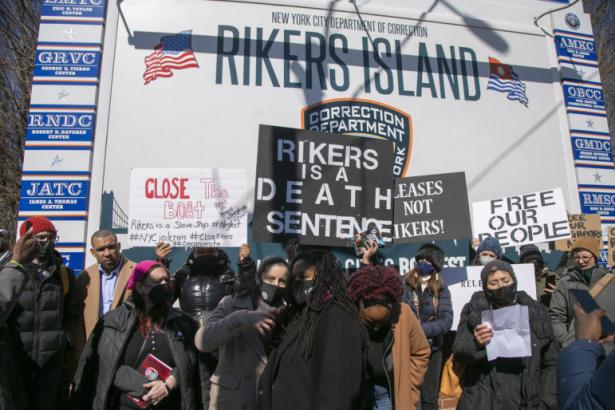Many New Yorkers welcomed the Donald Trump indictment brought by Manhattan District Attorney Alvin Bragg. After all, don’t we all love the plot twist that brings the villain to his knees? And Donald Trump has definitely earned his standing as the most villainous public figure of our era.
Favorable responses have also come from more than a few relieved pundits, heartened that our criminal legal system has met the difficult challenge of holding a controversial ex-president accountable, of demonstrating that no one is above the law, and that justice in America applies equally to all, no matter how rich or poor. One commentator on MSNBC, for example, opined that the Trump indictment represented the “restoration of the republic.”
But here’s the ‘however’: while the Trump indictment is a good thing from legal and political standpoints, the consequent positive spin from commentators about how justice works in our country is, sadly, misleading and overblown. The harsh reality is that, despite the possibility that a rich and powerful man may now be in for his just desserts, our criminal legal system is daily marked by widespread unfairness and a stark racial bias.
I have worked as an advocate in the justice field in New York City for about 45 years. During that time I have seen up close how our court, police, and prison institutions and systems operate. My sweeping criticisms are based on and informed by that extensive experience—I make them without reservation and with complete confidence that they reflect and describe the deeply discriminatory and harmful-to-humans impact of our law enforcement apparatus.
You do not have to take my word for it, though. Here are some damning facts. Sources? The systems themselves:
- 90 percent of the people locked up on Rikers Island are New Yorkers of color, there mainly because a NYPD officer has arrested them and they are too poor to afford bail. Bail, for all intents and purposes, functions as a pre-trial detention program for poor people.
- Since January 2021, 36 people have died on Rikers Island, a jail colony where most of the people confined are still presumed innocent. Most of the people who died there would likely still be alive had our criminal legal system not consigned them to a brutal correctional facility with woefully inadequate medical and mental health care.
- 95 percent of juveniles who the NYPD arrests annually are youth of color.
- The majority of NYPD arrests are for misdemeanors. Last year, 88 percent of such arrests involved New Yorkers of color. In some misdemeanor arrest categories, the racial disproportion was even more stark: 91.5 percent of fare evasion arrests involved New Yorkers of color; 94 percent of forged instrument arrests; 92.5 percent of possession of stolen property arrests; and 89 percent of contempt in the 2nd degree arrests.
- Last year, over 52 percent of NYPD felony arrests involved Black New Yorkers who make up 25.1 percent of the city’s population.
Staffed by representatives from my organization, The Police Reform Organizing Project (PROP), the Court Monitoring Project both involves my and other people’s up-close observations and produces more undeniable facts. As in the case of Donald Trump, everybody the NYPD arrests appears in arraignment court to hear the formal charges against them. To track NYPD arrest practices, PROP representatives regularly visit the arraignment parts in the criminal courts of Brooklyn, Queens, Manhattan, and the Bronx where they record and report on the proceedings.
During the eight years of Bill de Blasio’s mayoralty, for example, we released 12 court monitoring reports. All told, we observed over 7,000 cases, 89.3 percent of which involved New Yorkers of color. Under Mayor Eric Adams, arrest practices have become more aggressive and the racial bias even more stark. For example, in four recent weeks, from March 20 through April 14, when PROP visited the arraignment parts in our city’s four major boroughs, we observed 181 cases—168, or 92.8 percent of them, involving New Yorkers of color.
In New York City and in jurisdictions across our county, we teach our children that we provide equal justice for all people, not equal justice except if you’re a person of color, except if you’re poor. We claim that you’re innocent until proven guilty—a principle that pundits across the political spectrum have reminded us lately applies to Mr. Trump—not that you’re innocent until proven guilty unless you’re poor, unless you’re an individual of color.
In truth, prosecuting Donald Trump does not achieve such a lofty goal as the restoration of the republic. It does not really redeem our so-called justice system or absolve it of its long-standing and deeply entrenched racist and abusive practices.
That will take the kind sweeping and fundamental reforms in current practices that we as a people will not be prepared to take until we recognize and accept that in actual practice our vaunted legal apparatus does not fulfill our national ideals and, in fact, inflicts harm everyday on our poor and powerless citizens.
Robert Gangi is the executive director of the Police Reform Organizing Project (PROP). Prior to founding PROP in 2011, he was executive director of the Correctional Association for over 29 years.
City Limits' investigative journalism has informed and inspired New Yorkers for the last 46 years. Your tax-deductible donation will enable us to keep looking out for New York's most vulnerable: homeless and housing-insecure families, immigrants and local communities with limited social support. Donate now


Spread the word